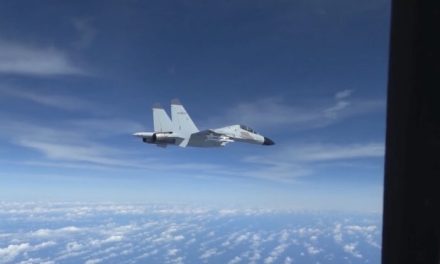By Bradley A. Thayer & Lianchao Han
 Hong Kong’s executive chief Carrie Lam has officially declared the death of the controversial extradition bill which triggered mass protests in the city since June. However, civil resistance, disobedience and clashes persist, creating a new dynamic which, in our view, will profoundly impact the future of Hong Kong, and very likely China as well.
Hong Kong’s executive chief Carrie Lam has officially declared the death of the controversial extradition bill which triggered mass protests in the city since June. However, civil resistance, disobedience and clashes persist, creating a new dynamic which, in our view, will profoundly impact the future of Hong Kong, and very likely China as well.
To assess the impact of Hong Kong’s recent civil resistance, we need to understand its evolution. During China-U.K. negotiations over Hong Kong’s status in the 1980s, civil resistance and the “pro-independence” sentiment were nonexistent. The turning point was the 1989 Tiananmen Square Massacre when the People’s Liberation Army (PLA) crushed student protesters who demanded democracy and a clean government. To this day, we still do not know how many hundreds or thousands of innocent people were killed by the PLA.
The impact of Tiananmen on Hong Kongers was great. They wholeheartedly sided with the pro-democracy protesters before and after the massacre. They helped to rescue many student leaders and activists from the Mainland through secret means. The city itself was rocked by mass protests condemning the atrocity.
Since Tiananmen, the Communist regime has been worried that Hong Kong will become the anti-Chinese Communist Party (CCP) epicenter, which will threaten the security of the CCP regime. Beijing has all-but-formally rejected its commitment to the Hong Kong people’s self-governance and the “one-country-two-systems” political framework. One measure Beijing took was to require that the Hong Kong Basic Law Drafting Committee re-draft Article 23, which demands that Hong Kong enact laws prohibiting “treason, secession, sedition, subversion, or theft of state secrets,” and “foreign political organizations’ activities” in the city. It also prohibits Hong Kongers from having any relations with foreign forces.
The alteration of Article 23 is significant because China has used vaguely defined “subversion” to incarcerate many political and human rights activists for criticizing the CCP. The newly added language regarding subversion and foreign forces in Article 23 caused many Hong Kongers to fear their loss of freedom to Beijing.
This fear was realized when the Hong Kong government decided to introduce a national security bill to implement Article 23 in 2003, which triggered mass protests. On July 1, 2003, over a half million Hong Kongers took to the streets to protest against this legislation, and they stopped traffic and encircled the government headquarters for six hours.
When the CCP realized its tactical mistake, it created immediately after the protest, a Central Coordination Group for Hong Kong and Macao Work, which consists of 18 agencies. Zeng Qinghong, a CCP standing committee member, directed the group. He redesigned CCP’s strategy and increased the number of CCP’s operatives in Hong Kong to tighten control. This included dispatching a large number of spies and united-front workers, hiring Hong Kong local mafia as Beijing’s thugs, and encouraging many pro-CCP mainland businessmen to move to Hong Kong. Since 2003, Beijing has been directly interfering in Hong Kong affairs. The unfortunate truth is that the Hong Kong government is just a puppet of Beijing.
After 2007, Xi Jinping replaced Zeng and became the chief of the group. Under his leadership, the group formulated and carried out more sinister policies to Sinicize Hong Kong, as the CCP has done to Tibet, and Xinjiang, the home of China’s Muslim Uighur minority. After Xi became the CCP’s paramount leader, discreet Sinicization was abandoned in favor of forceful integration and assimilation. The niceties and politeness of China’s relationship with Hong Kong are abandoned, replaced by threats and broken promises.
In 2014, when Xi refused to honor Beijing’s promise to allow Hong Kongers to vote directly for their government chief executives and Legislature, which was scheduled to take place in 2017, Hong Kong’s civil resistance was resurrected. Pro-democracy demonstrators in the city launched “Occupy Central” campaign, also known as “Umbrella Movement,” which demanded that the regime leaders allow genuine universal suffrage. The protesters blocked roads in three downtown districts—Admiralty, Causeway Bay and Mong Kok. More than a million people participated and essentially paralyzed parts of Hong Kong for 79 days. The movement failed partly because Hong Kong’s majority of elites refused to participate in it, and also due to Beijing’s extensive efforts to sabotage the movement. China’s retaliation against the leaders of the Occupy Central movement was a stark and severe example of its treatment those it perceives as subversives.
If the Occupy Central was a movement for political rights, the current Anti-Extradition movement should be considered the last defense of Hong Kong’s rule of law. After the Occupy Central, the CCP adopted a multifaceted approach to curtail the city’s civil resistance. One of the critical components is the development plan for the Guangdong-Hong Kong-Macao Greater Bay Area announced early this year, which will make Hong Kong a permanent political and economic part of the mainland. The CCP even plans to impose its Social Credit system into Hong Kong to keep people in line with Beijing.
The CCP’s increased assertiveness and aggression against the Hong Kong people naturally have caused trepidation and great concern. That extraordinary tension was released when the extradition bill introduced. Even the elite felt that their safety is in danger. Moreover, the CCP’s princelings and powerful political families who hide astronomical assets in the city also became greatly worried that they may fall victim to the CCP’s internal power fights as the PRC gains greater control over the city.
These factors made civil resistance partially successful. Among the five demands the protesters put forward, Carrie Lam met only one—the withdrawal of the extradition bill—but refused the rest, including the release of those arrested so-called “rioters.”
Her position reflects the pattern of how the CCP handles Hong Kong affairs, one step backward to de-escalate tensions in order to take two steps forward toward greater repression.
The CCP can do this not only because of the overt pressure they can bring to bear but also because of its covert ability to ensure its wishes are met. Since the Communists came to power in 1949, the PRC has possessed a secret network of agents in Hong Kong. The British transfer of sovereignty in 1997 allowed the CCP to strengthen its networks significantly. Of course, Beijing also recruits many Hong Kong elites, with financial interests and other incentives, to work for the regime, and to actively participate in overt and covert political actions. The recent violent clashes between Beijing’s supporters and pro-democracy activists are evidence of Beijing’s muscle and reach into Hong Kong, and the ability to cause substantial unrest.
At the same time, Beijing always blames foreign forces for any civil resistance in Hong Kong, and this time is no exception. The CCP has launched a smear campaign to blame the U.S. and U.K. for the ongoing anti-extradition bill protests in Hong Kong to deceive the world. Last month, dusting off the old canard, Chinese Foreign Minister Wang Yi angrily denounced the “Western forces are trying to undermine Hong Kong’s peace and stability.”
However, despite the CCP’s disinformation and censorship, more and more Mainland Chinese learned about the protests and are inspired by them. The democratic “spirit of Hong Kong” could jump the firebreak Beijing has created around Hong Kong and spread rapidly to the Mainland. Xi’s regime is concerned about this and explains why the regime was quick to dispatch PLA tanks to crackdown on a protest in the city of Wuhan. These protests took place at the same time as those in Hong Kong, and ended with a victory, even if temporary, for the protesters, as the government withdrew the plan.
In our view, Hong Kong’s civil resistance is a protracted contest between Hong Kong people and Beijing’s dictators. The struggle requires not only courage and wisdom but also endurance to succeed. The pro-democracy Hong Kongers have proven they will fight for their rights against one of the most formidable and effective dictatorships the world has witnessed. They will prevail in if the international community stands in solidarity with them to force Beijing to pay a high price for their repression. What is happening now in Hong Kong is a window into the future. As China becomes more powerful, it will favor control over respect for its agreements and the political rights of its partners in the Belt and Road Initiative.
The CCP has a perverse Midas touch. At least Midas turned everything he touched to gold. Everything the CCP touches, they ruin. Their control over Hong Kong is more valuable to them than the wealth the city creates. Accordingly, they would rather destroy its wealth than allow it to continue with its own political system—which, in fact, Beijing is required to honor according to the 1984 agreement with the U.K..
The pro-democracy movement in Hong Kong weakens the CCP’s power because it reveals its illegitimacy and inspires Mainlanders to recognize that a free system is possible, will work, and is far superior to despotism.
This article first appeared in RealClearDefense on July 26, 2019























